- Home
- Chris Wraight
Battle Of The Fang Page 14
Battle Of The Fang Read online
Page 14
CHAPTER NINE
Dawn broke over Asaheim, throwing weak golden beams through the mountains, gilding the long kilometres of unbroken snow with a faint sheen. The light ran down the flanks of the Fang as the shafts broke clear of the shoulder of Friemiaki.
It showed up a scene of desolation. The Thousand Sons leaguer was complete, a ring of steel around the isolated peak. The rain of plasma from the fleet in orbit continued without pause, smashing into the fortress’s void shields and cascading through the empty air. All passes to and from the Fang were now sealed, blocked by the swollen host of infantry and mechanised units. Heavy artillery had been dug into the cliffs facing the Fang, and every barrel pointed at the lone profile of the Wolves’ bastion. Ranks of men were still moving, taking up forward positions, covered by flanking columns of tanks and low-flying squadrons of gunships. Heavy ordnance had already been broken out, and a steady torrent of shells whined across the frozen sky to crash against the distant stone and ice of Russ’s citadel.
From a viewing platform high above the Sunrising Gate, Greyloc, Sturmhjart and Wyrmblade watched the unfolding deployment of the enemy. From below came the sound of drilling and hammering, punctuated by the flares of arc-welders and las-burners. The huge batteries above and alongside the gate were being augmented by extra troop-killing arrays dragged up from the armouries. The Gate itself, wide enough for a hundred men to walk through abreast, had been sanctified by the Rune Priests and painted with fresh signs of aversion. The colossal structure of adamantium, granite and ceramite bristled with linked boltgun turrets, rocket-launchers and static plasma cannons. The firepower collected there was vast, the kind of arsenal more suited to a battlecruiser group than a land-bound citadel. Within the locked doors of the gates stood the defenders, housed in power armour or sealed within the holds of Land Raiders, waiting for the moment to be loosed from cover. Across the entire structure stretched the shields, glistening faintly as the oblique sunlight slanted through clouds of burning engine oil.
Greyloc augmented his scan of the enemy host, assessing the numbers, the distances, the power they could bring to bear.
We must make them pay for the passage of the gates.
He felt calm, alert, poised. The raids on the landing sites had given his warriors their haul of bodies and delayed the onslaught of the main mass of troops. There had been losses, but nothing like those suffered by the enemy.
‘How have they amassed such an army?’ asked Sturmhjart, looking impressed. ‘The sagas say we crippled them.’
‘More of them to kill,’ observed Wyrmblade dryly. ‘Be glad of it.’
‘They have been planning this for centuries, Rune Priest,’ said Greyloc. ‘Ironhelm should have seen this coming. We all should have seen this coming.’
Sturmhjart’s nostrils flared under his helm. He had worked with incredible energy over the past three days to bolster the Fang’s wards against sorcery, and was still smarting from his failure to read the runes.
Recognising this, Greyloc turned to him. ‘I make no criticism of you, brother. Their power to corrupt the wyrd is their infamy.’
‘They do not corrupt the wyrd,’ Sturmhjart insisted.
Wyrmblade laughed harshly.
‘You know what, brother? I really don’t give a damn where their witchery comes from. They can burn in the fires of Hel like mortal men well enough, and that’s all that matters.’
Sturmhjart gave the Wolf Priest a long look, as if he wasn’t sure whether he was being mocked or praised.
‘They’ll burn,’ he muttered, turning his rune-engraved helm to face the distant enemy. ‘Oh, they’ll burn.’
Then there was a thud of fist against breastplate from behind them, and Hamnr Skrieya joined them on the viewing platform. Like all the Wolf Guard he bore the signs of recent conflict on his armour – his power fist was charred from energy field burn and the pelts on his Terminator suit were no more than scraps of tangled fur.
‘Skrieya,’ acknowledged Greyloc. ‘Is the recall complete?’
‘It is, Jarl.’
‘The tally of blood?’
‘We hurt them, Jarl. Casualties were minimal, but... not insignificant. One pack was lost.’
Greyloc raised an eyebrow. The recall order had been given before the advent of the sorcerers had made the field deadly for his kill-squads.
‘A pack? Whose?’
Skrieya hesitated for a heartbeat.
‘Tromm Rossek’s, Jarl.
Greyloc felt as if Skrieya had kicked him in the stomach.
Rossek. Of all my elite, Rossek...
‘He was recovered, but his pack is gone.’
Greyloc suppressed the rush of conflicting emotion at the news. Even in armour, his pheromone state was still open to the others.
The true Son of Russ, the headstrong warrior, the unstoppable one. My brother, this is why you could never be Jarl.
‘He must be disciplined,’ said Wyrmblade, coldly. ‘His pack would have fought alongside us.’
‘Not now,’ snarled Greyloc. ‘We will need his blades.’
For a moment Wyrmblade looked like he would protest, but then bowed his head.
‘As you will it, Jarl.’
There was a frosty silence. In the distance, the marshalling of the enemy forces continued. With every passing moment, the valleys leading to the gate causeways were filling with the Traitor vanguard. They would be unleashed before the sun reached zenith.
Greyloc looked back out across the battlefield to come. Under his helm, his pale face was fixed in a grim mask of bitterness.
‘I will nothing but for this fight to begin,’ he growled, and the hairs on his body rose in readiness. ‘Blood of Russ, let them come to me now, and I will show them the meaning of agony.’
Arfang had taken longer than expected to make the summons. For a while, Freija had begun to hope that he’d found someone else to guard his precious servitors, and had concentrated on her other huskaerl duties single-mindedly. There had been plenty of those, including weapons drills with her squad, many of whom weren’t nearly at the standard she’d have hoped for.
But the Iron Priest had not forgotten, and even as the Thousand Sons army began to close the stranglehold on the Aett, painfully establishing their forward positions in the surrounding peaks, he came back for her.
‘The time has come,’ he’d said, and that had been all. So she’d left the Valgard with her squad, asking no more questions, ready for wherever Arfang would take her. Soon enough it became clear. They were headed down. A long way down.
Mortals like Freija, for all their Fenris-born prowess, weren’t able to plummet unaided down the vertical shafts that linked the levels of the Fang. Even if she could have done it, the servitors certainly couldn’t – those plunging drops were only possible for the Sky Warriors. So the journey down the many hundred levels from the Valgard at the summit of the Fang to the lower reaches of the Hould took a long time. The motley company rode on more than a dozen clattering turbo-elevators, tramped down several long spiral staircases hewn from the stone and marched across countless rough-cut chambers glowing with the embers of old fires. With every level they passed, the decorations in the rock became less ornate, the glowglobes a little less close together, the voices a little more hushed.
They’d swept quickly through the Fangthane, now teeming with thralls. Freija knew her father had been charged with its defence, but there was no sign of him amongst the milling crowds when she and Arfang got there. Squads of mortals were busy installing gun turrets at the far end, and there were heavy lengths of waist-thick cables strung along the floors. That alone made her blood run a little more chill. The Fangthane was a sacred chamber, and if the Jarl expected to make war here then the carnage of the coming assault would surely be greater than anything unleashed on Fenris before.
Freija found herself wondering if the Sky Warriors felt even the smallest fragments of trepidation at that. They’d have to be inhuman not to.
But of course
, they were inhuman. Not so much a different class as a different species.
Species. Sounds like I’m classifying beasts.
After the Fangthane, they’d kept going down, climbing ever further into the deeper levels of the Aett. The Hould, the vast and teeming hive of tunnels where Freija had been born and spent her early life, was not the raucous, buzzing place she knew. The thralls went about their business with looks of tight expectation, all of them hefting arms, most led by an experienced kaerl at their head. Barricades were being erected at strategic points in the tunnel network and mobile gun platforms installed at cross-ways. The warding runes, the Eyes of Aversion which guarded every major intersection, were being re-sanctified by the Rune Priests and their leather-masked wyrd-thralls. Munitions were piled high, kept under the watchful eyes of huskaerls as more cases arrived hourly from the huge armouries.
Every so often a Sky Warrior would stalk past them on some urgent errand, streaked with fresh blood on his charred armour. They never acknowledged her, but all nodded respectfully to Arfang before striding off into the shadows. Freija could sense the heightened level of tension in their gestures – they’d already been fighting for days, and were heavily primed for coming battle, their golden eyes blazing, and that made them even more terse and inscrutable than ever.
At the base of the Hould, buried kilometres down into the rock, was Borek’s Seal, the largest of the Fang’s innumerable chambers. Even more massive than the Fangthane, the enormous cavern was a gloomy and shadow-draped place. Just as the Fangthane guarded the approaches from the Hould to the Jarlheim, Borek’s Seal warded passage to the levels below, the Hammerhold and the half-explored Underfang. It was colossal, the size of a battleship’s hull, though almost empty of decoration and devoid of the pelts, bones and carvings that adorned most chambers of the Aett. The bare rock walls were unfinished and jagged, a reminder of the primal nature of the Wolves’ ancient origins. A few fires burned low in vast circular pits, but their light was weak and the perma-chill was little disturbed by them.
Even as she marched across the yawning cavern in convoy with the chittering, limping servitors, Freija found herself gazing up at the huge columns supporting the far-off roof. Each was the width of a Rhino chassis, a shaft of naked rock that glinted with points of red from the low flames.
She’d never come down this far before. No-one she knew had. This was below the Gate level, the limit of the kaerls’ patrol circuits, and beyond it none but the Iron Priests went.
‘Frightened, huskaerl?’ asked Arfang, his staff thudding against the stone as he strode.
Frightened wasn’t a state that had much meaning on Fenris beyond a generic, abstract insult. ‘Watchful, lord,’ replied Freija, as curtly as she dared.
Arfang let slip a grating chuckle.
‘Just so. I would not want whelps down here with me. That would not do.’
Freija looked at the Iron Priest carefully. In the dark, his armour was as black as scorched metal, lined with red from the fire-pits.
‘Forgive me, lord,’ she ventured. ‘This is unusual. Kaerls do not travel to the Hammerhold.’
‘They do not,’ agreed Arfang.
They continued walking. The Iron Priest didn’t seem to feel the need to offer any further explanation.
‘So, if I may ask–’
‘You wish to know why I summoned you, what possible use a mortal could be to me down here.’
‘I cannot imagine you needing my help.’
Arfang stopped walking and turned to her. Behind the two of them, the trail of servitors clattered to a halt.
‘You think there’s no danger in the forges?’
‘We are in the Aett, lord.’
‘We are on Fenris, huskaerl. We do not eliminate the danger on this world, even though we could. We keep it close to us, learn to live with it, use it to keep us strong. The Underfang has many perils. Some are not known even to the Great Wolf.’
‘But we aren’t going to the–’
‘This is a time of danger, and there are ways from the dark places into the Hammerhold. If I could have chosen, I would have come here with a pack of Hunters. But they are all needed to cut threads, so mortals will have to do.’
He leaned forwards, and his eyes glowed like old stars.
‘Waking the dead is difficult,’ he growled, his voice low and rumbling. ‘It will devour my attention for many hours. While I am engaged, the thralls will need guarding. Can you do that, huskaerl? Or are you afraid of the deeper dark?’
Freija glared back at him, stung by the implied weakness. She felt the flare of rebellion in her breast, the always-present urge to lash out at the arrogance of the armoured demigods who dictated every aspect of her life. They only lacked fear because it had been bred out of them by the Helix, yet how quickly they learned to despise mortal emotion, the very core of the humanity they were charged with protecting.
‘I fear nothing, lord,’ she said, keeping the worst of the irritation from her voice.
The Iron Priest’s helm-face was blank, but the subtle movement of his head told Freija that, somewhere under all that battered plate, he was smiling at her.
‘We’ll see, huskaerl,’ he said, resuming his thudding stride. ‘We’ll see.’
Morek walked across the floor of the Fangthane, weaving his way between the incoming columns of wounded and returned. Most had been landed by the Thunderhawks higher up in the Valgard, but some had come in through the land gates. The massive hall was filled with sound and movement as kaerls hurried to install more gun platforms even as files of warriors brushed past them, hurrying to other deployment points.
Amid them all came the Sky Warriors. Some walked tall, bearing the mark of victory in their gold eyes, strutting and prowling among the mortals like demigods. Other packs had taken casualties, and prickled with shame and an evident desire to get back into the fray. They were all wound tight, the ones who’d suffered, burning with a sullen, dark resolve to make amends. Morek knew well enough to avoid close contact with them. When the beast was active within them, they sometimes had trouble remembering who the enemy was.
‘Rivenmaster!’ came a throaty, rattling voice.
Morek whirled round to face it, and his heart sank.
A Wolf Guard was limping toward him. The huge figure loomed out of the fire-lit dark in Terminator plate. The armour was cracked and battle-scarred, and the warrior within looked similarly damaged. He’d taken his helm off, revealing a heavily tattooed face ringed by a russet mane. Studs glinted from his temples, and his eyes betrayed a wild, destructive grief.
Beside him on a suspensor platform floated the body of a Grey Hunter, strapped to the mobile stretcher, lying totally motionless. His armour had been carved apart, and long trails of blood ran over the plate. Lights flickered along the suspensor chassis, etching out the shapes of sigils. Morek was no apothecary, but he could understand the Rune of Ending as well as any other Fenrisian.
‘I serve, lord,’ he said, bowing.
‘Get this warrior to the Lord Wyrmblade,’ the Wolf Guard growled. ‘Do it now.’
Morek hesitated, just for a moment. He’d been ordered to oversee the preparations for the Fangthane defence. There were countless thralls who could escort a wounded Sky Warrior to the Wolf Priests.
He could have protested. It would have been pointless. The Wolf Guard before him was wounded and was clearly struggling to contain a furnace of sullen, frustrated fury.
‘I will, lord,’ he said, trying not to think about the many things that would remain undone in his absence.
The Wolf Guard grunted, and shoved the suspensor toward him. It bobbed lightly as it was touched. Morek could see the extensive trauma on the ruined body, the deep sword-wounds and congealed blood. It looked like the Hunter was in what his kind called the Red Dream, the deep regenerative process triggered by the too-close embrace of Morkai.
‘Go swiftly, mortal,’ growled the Wolf Guard, turning to go back the way he’d come, then hesitating.
‘What are you called?’
Morek looked him in the eye. Long experience had taught him that you always had to look them in the eye.
‘Morek Karekborn, lord.’
‘Guard him well, Morek Karekborn. When this is over, I will seek you out. His name is Aunir Frar, Grey Hunter of my pack. His wyrd and yours are now one. Remember it.’
Morek maintained eye contact, though it was difficult. The Wolf Guard’s amber irises seemed strangely out of focus, as if some massive assault had damaged something within him. What could not be doubted was the urgency in the words.
‘I understand,’ Morek replied, already planning the route of his ascent to the home of the fleshmakers, a place that, before that hour, would have been death for him to even approach. ‘His wyrd is mine. My life for his.’
On the eighth day since the Thousand Sons had arrived in orbit around Fenris, the assault on the gates of the Fang began.
Though each of the two land portals, Bloodfire and Sunrising, were high up the sheer sides of the mountain, they stood at the termination of massive ridges between the peaks, allowing movement up towards them from the surrounding highlands. The ridges ran up to the citadel gates like huge causeways of stone, each kilometres wide and worn smooth by the endless gnawing of the winds. In the half-forgotten millennia past, the Allfather and Leman Russ had walked on that same stone, planning the construction of the Aett together, seeing how the tortured landscape of Asaheim could be made to house the greatest fortress outside Terra. Russ had made it so that the two Gates overlooked entirely bare approaches, such that any massed advance on them would provoke a slaughter.
As Greyloc watched the massive forces under the command of the Thousand Sons begin to roll forwards, he gave silent thanks for that foresight. The host assembled by the invaders, revealed in the sharp glare of the late noon sun, was beyond anything he’d seen marching under a Traitor’s banner. The Great Scouring had devastated the Legions of the Betrayers, and Magnus’s own troops had been thinned out during the inferno on Prospero. In the intervening centuries, they had clearly been busy.

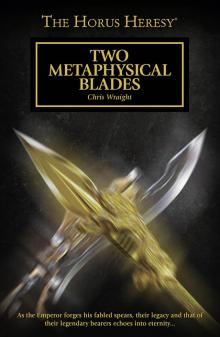 Two Metaphysical Blades
Two Metaphysical Blades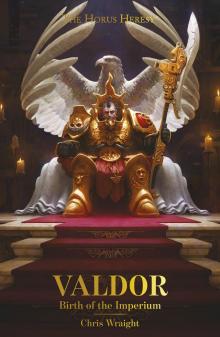 Valdor: Birth of the Imperium
Valdor: Birth of the Imperium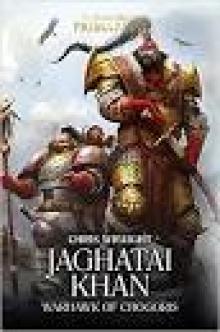 JAGHATAI KHAN WARHAWK OF CHOGORIS
JAGHATAI KHAN WARHAWK OF CHOGORIS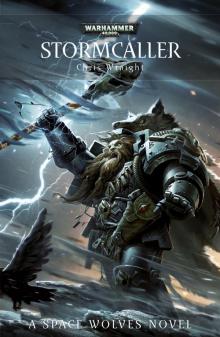 Stormcaller
Stormcaller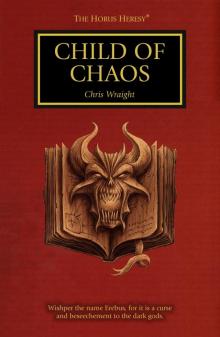 Child of Chaos
Child of Chaos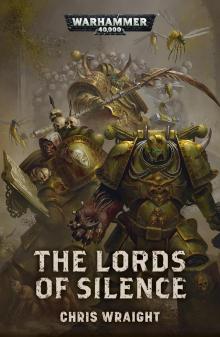 The Lords of Silence
The Lords of Silence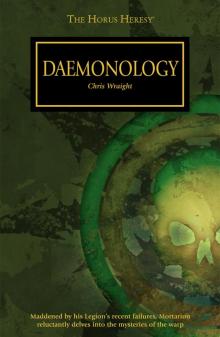 Daemonology
Daemonology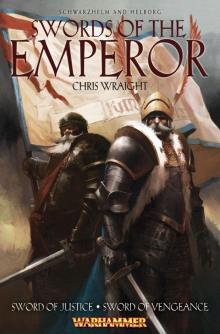 Swords of the Emperor
Swords of the Emperor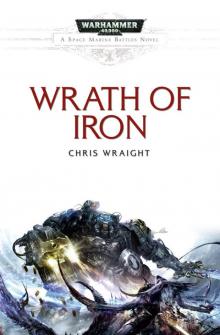 Wrath of Iron
Wrath of Iron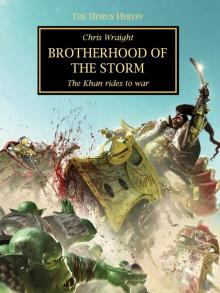 Brothers of the Storm
Brothers of the Storm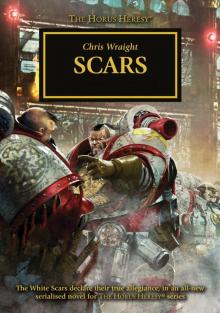 Horus Heresy: Scars
Horus Heresy: Scars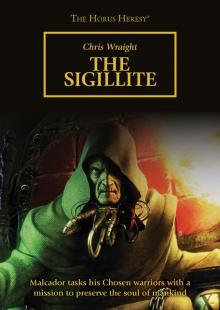 The Sigillite
The Sigillite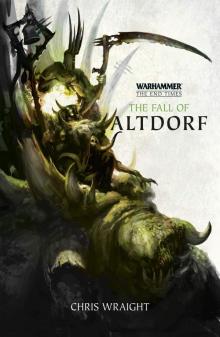 The End Times | The Fall of Altdorf
The End Times | The Fall of Altdorf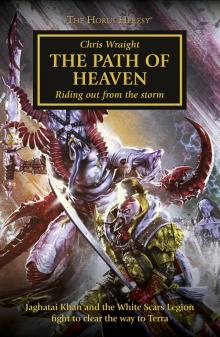 The Path of Heaven
The Path of Heaven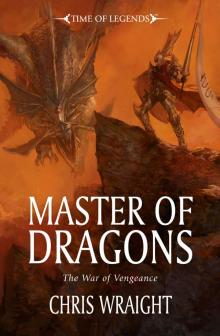 Master of Dragons
Master of Dragons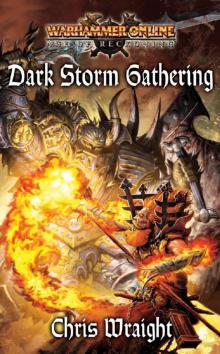 WH-Warhammer Online-Age of Reckoning 02(R)-Dark Storm Gathering
WH-Warhammer Online-Age of Reckoning 02(R)-Dark Storm Gathering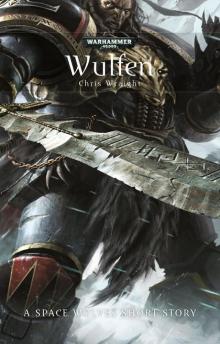 Wulfen
Wulfen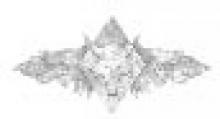 Battle Of The Fang
Battle Of The Fang Onyx
Onyx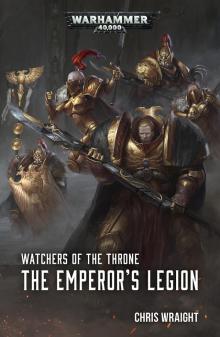 Watchers of the Throne: The Emperor’s Legion
Watchers of the Throne: The Emperor’s Legion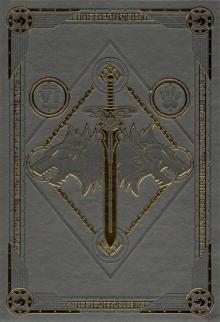 Leman Russ: The Great Wolf
Leman Russ: The Great Wolf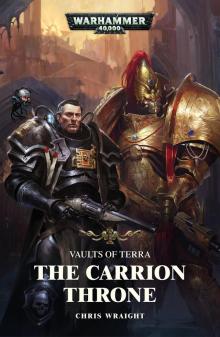 Vaults of Terra: The Carrion Throne
Vaults of Terra: The Carrion Throne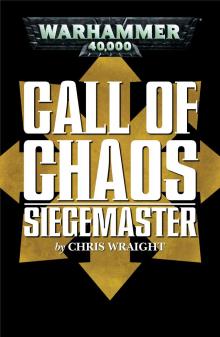 Siegemaster
Siegemaster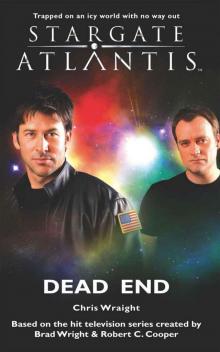 STARGATE ATLANTIS: Dead End
STARGATE ATLANTIS: Dead End Scars
Scars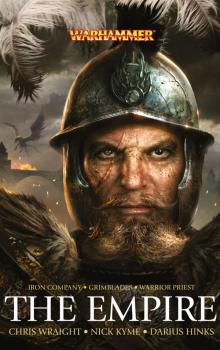 The Empire Omnibus
The Empire Omnibus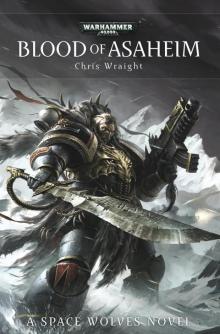 Blood of Asaheim
Blood of Asaheim